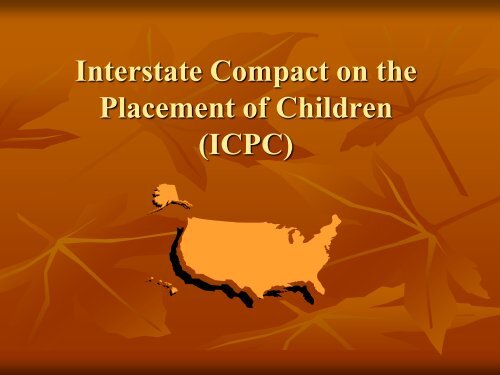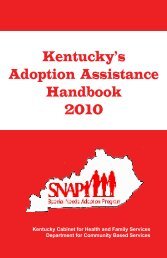The ICPC tutorial - A Family For Every Child
The ICPC tutorial - A Family For Every Child
The ICPC tutorial - A Family For Every Child
You also want an ePaper? Increase the reach of your titles
YUMPU automatically turns print PDFs into web optimized ePapers that Google loves.
Interstate Compact on thePlacement of <strong>Child</strong>ren(<strong>ICPC</strong>)
ObjectivesAt the end of this training you will:-Be knowledgeable about the <strong>ICPC</strong>regulations & process-Be able to complete the <strong>ICPC</strong> forms
<strong>ICPC</strong> is:A statutorily binding agreementadopted by all 50 states, the Districtof Columbia and the U.S. VirginIslands. <strong>The</strong> agreement governs theplacement of children from one stateinto another state.
Why do we need the <strong>ICPC</strong>?It ensures thatchildren are placed in a safe andappropriate environmentstates remain legally and financiallyresponsible for the children placed outsidetheir borderschildren receive courtesy supervision byappropriate <strong>Child</strong> Welfare personnel in thestate where they are placed
<strong>ICPC</strong> RequirementsPrior to <strong>ICPC</strong> placement, a home study(including criminal background and CPShistory checks) must be completed in thereceiving state and placement approvalfrom the receiving state’s <strong>ICPC</strong> officemust be obtained.
<strong>ICPC</strong> requirements, cont.Dismiss the sending state’s jurisdictiononly with written concurrence from theappropriate authority in the receivingstate.
When does the <strong>ICPC</strong> apply?When a custodial parent seeks to place a child inresidential treatment or with a non-relatedadoptive family located out-of-stateWhen a child is in the custody of an agency,such as DHS, and the agency seeks to place thechild in another state with a parent/relative or intoa foster home, adoptive home or residential carefacility. **
**Placement of children in DHScustody into an out-of-stateresidential facility can occur onlyafter consultation with aResidential Resource Consultant(RRC), and with a contract inplace with the facility.
Diligent Search for RelativesRequired by state and federal lawLiving in another state is not a barrier forrelatives to be consideredNo limit on the number of <strong>ICPC</strong> requests whichcan be made at one time (however, if requests going tothe same state, that state may ask that requests be prioritized inorder to conserve limited staff resources)
Visits vs. Placements(<strong>ICPC</strong> Regulation 9)A child traveling out of state is considered to be ona visit when:•it is for a brief social or cultural experience; and•the visit has a definite end date; and•the visit is no longer than 30 days, or begins andends within a school vacation; and•there has been no request for a home study orsupervision.<strong>ICPC</strong> is not required for visits.
Discussion QuestionA family has beenreceiving voluntaryservices from your branch.<strong>The</strong> father is offered a jobin Florida and wants tomove his family there. Isan <strong>ICPC</strong> request required?Why or why not?
<strong>ICPC</strong> Process<strong>The</strong> process begins when the caseworker completes areferral packet and sends it to the Oregon <strong>ICPC</strong> office.Scan packet and e-mail to oregon.icpc@state.or.us(Do not save the packet into OR-Kids!)
<strong>ICPC</strong> Referral Checklist• Cover letter (form 100E)*• Caseworker statement form• 100A*• 1044*• Court order*• <strong>Child</strong>/case information*• Copy of birth certificate & Social Security card• Proof of paternity (if requesting study on father orpaternal relative)• TPR or relinquishments• Copy of home study on the family, if a study exists*required
<strong>ICPC</strong> ProcessCaseworker sendsreferral to <strong>ICPC</strong>office<strong>ICPC</strong> office reviewspacket and sends it toreceiving state<strong>ICPC</strong> office documentsplacement decision andinforms case worker.Receiving state completeshome study and approves or deniesplacement, then sendsdecision back tosending state <strong>ICPC</strong> office.
<strong>ICPC</strong> Process, cont.If placement is denied, the <strong>ICPC</strong> recordis closed, and no further action isneeded from the case worker.If placement is approved, the child(ren)can be placed, and the other statemust be notified of the placement sothat supervision can begin.
<strong>ICPC</strong> Process, cont.When informed about placement, theOregon <strong>ICPC</strong> office will notify the receivingstate and request supervision of theplacement. <strong>The</strong> receiving state will assigna social worker to see the child and sendback progress reports.
Interstate Compact on the Placement of <strong>Child</strong>renReport on <strong>Child</strong>’s Placement StatusOne form per childTO:FROM:SECTION I — IDENTIFYING INFORMATION<strong>Child</strong>’s Name:Mother’s Name:SECTION II — PLACEMENT STATUSInitial Placement of <strong>Child</strong> in Receiving StateName of Resource:Address:Type of Care:Placement ChangeName of Resource:Address:Type of Care:SECTION III — COMPACT PLACEMENT TERMINATIONBirth Date:Father’s Name:Date <strong>Child</strong> Placed in Receiving State:Effective Date of Change:Adoption Finalized In Sending State In Receiving State Court Order Attached<strong>Child</strong> Reached Majority/Legally EmancipatedLegal Custody Returned to Parent(s)Court Order AttachedLegal Custody Given to RelativeCourt Order AttachedName:Relationship:Treatment CompletedSending State’s Jurisdiction Terminated with the Concurrence of the Receiving StateUnilateral Termination<strong>Child</strong> Returned to Sending State<strong>Child</strong> Has Moved to Another StateProposed Placement Request WithdrawnName of Placement Resource:Approved Resource Will Not Be Used <strong>For</strong> PlacementName of Approved Placement:Other (Specify):Date of Termination:SECTION IV — SIGNATURESSignature of Person/Agency Supplying Information:Date:Signature of Compact Administrator, Deputy or Alternate:Date:
Discussion QuestionOregon DHS removes a childfrom his father’s home in Oregonand places the child in fostercare. <strong>The</strong> mother lives in Texas.She will need to complete anumber of services prior to thechild being placed with her. Doyou send an <strong>ICPC</strong> request? Whyor why not?
Time lines• Federal law requires interstate homestudies to be completed within 60 days.• Placement must be made within 6 monthsof approval.
Priority Placement (Reg. 7) CriteriaProposed placement is with:ParentStep-parentGrandparentAdult uncle or auntAdult sibling, orLegal guardian
Priority Placement (Reg. 7) Criteria(cont.)and the case meets at least one of thefollowing criteria:Unexpected dependency due to recent incarceration,incapacitation, or death of a parent or guardian, or<strong>The</strong> child is under 4 years of age, or<strong>The</strong> court finds that any child in the sibling group to beplaced has a substantial relationship with the proposedplacement, or<strong>The</strong> child is currently in an emergency placement.
Priority Placement (Reg. 7) Criteria(cont.)<strong>The</strong> receiving state is expected to approveor deny a priority placement within 20business days.Some states are not able to comply withRegulation 7 timelines.
Break!
<strong>ICPC</strong> Office to <strong>ICPC</strong> Office CommunicationPlacement requestsPlacement approvalor denialNotification ofplacementsSupervision reports<strong>ICPC</strong> case closure
Communication With <strong>The</strong> OtherState’s <strong>ICPC</strong> OfficeAll communication with the <strong>ICPC</strong> office inthe other state must go through the Oregon<strong>ICPC</strong> office. Caseworkers should notcommunicate directly with the other state’s<strong>ICPC</strong> office.
Caseworker to CaseworkerCommunicationOregon case workers are encouraged tocommunicate directly with case workers inthe other state regarding case planning andday-to-day issues.
TravelOregon <strong>ICPC</strong> will cover expenses to move childrento or from an <strong>ICPC</strong> approved placement. Travelcosts must be pre-authorized by <strong>ICPC</strong>, and travelcannot be authorized until placement is approved.<strong>ICPC</strong> is billed direct for flights, and reimburses forother authorized expenses. Limits for travel areset out in policy.
Travel, cont’d.<strong>ICPC</strong> also can cover pre-authorizedexpenses for a pre-placement visit priorto an adoptive placement.
Relocation(Regulation 1)Allows children in DHS custody to move toanother state prior to <strong>ICPC</strong> approval, with foster family adoptive family prior to finalization legal parent or guardian
Items to include with a Reg 1 referral• <strong>For</strong> foster and adoptive families, existing homestudy and foster certificate• <strong>For</strong> legal parents or guardians, current actionagreement and any recent evaluations or otherbackground information• 100B showing date family is moving
Relocation of DD foster homesWhen a foster family is receiving DDpayments for fostering a child withdevelopmental disabilities, DD payments willnot continue when the child moves out ofstate. <strong>Child</strong> Welfare must open the fostercare service and establish the payment rateprior to the move.
Discussion QuestionCaseworker removes a child frommother today. Father in New Mexicohas joint custody and wants his child.Does <strong>ICPC</strong> apply?Why or why not?
<strong>ICPC</strong> Regulation 3:Placement with ParentsRegulation 3 allows a court to place achild with a parent without goingthrough <strong>ICPC</strong>, provided that:‣ <strong>The</strong> court has no evidence before it,and seeks no evidence, that theparent is unfit; and‣ <strong>The</strong> court dismisses its jurisdictionimmediately.
Financial Considerations• <strong>The</strong> sending state retains responsibility forfinancial support– i.e. foster payments,payment for services, etc.• Foster payment is made at Oregon rate,including any level of care assessed perCANS. Personal care payments are notmade out of state.
Financial Considerations, cont.When child is placed with a parent, theparent is responsible for the child’sfinancial support and for ensuring that thechild’s medical needs are met.
Medical Considerations for<strong>Child</strong>ren in Substitute Care<strong>The</strong> substitute caregiver will need to apply forMedicaid in the receiving state. If the child is notTitle IV-E eligible, the substitute caregiver will berequired to produce an original or certified copy ofthe birth certificate to prove identity & citizenship.
Medical Considerations for <strong>Child</strong>renin Substitute Care, cont.If the child is IV-E eligible, provide a COBRA letterto the substitute caregiver.
Medical Considerations for <strong>Child</strong>ren inSubstitute Care, cont.If Medicaid is denied, the child will remain onOregon Health Plan, and the substitutecaregiver will need to find service providerswho agree to enroll as OHP providers by calling1-800-422-5047.
Medical Considerations for <strong>Child</strong>renin Substitute Care, cont.If children are not IV-E eligible and being placedfor adoption, it is best to have AdoptionAssistance (AA) in effect for date of placement.In most states, children will be eligible formedical coverage if AA is in place.
Discussion QuestionYou receive <strong>ICPC</strong> approval to place a child withhis father in Utah. Based on the positive homestudy, the father’s attorney asks the court todismiss jurisdiction. What do you do?A. Agree that dismissal sounds like a good idea.B. Oppose dismissal.C. Take no position.
Closing the <strong>ICPC</strong> Case<strong>ICPC</strong> closes when:• Adoption is finalized*; or• Legal custody and/or guardianshipis awarded to the caretaker*; or• Legal custody is given to the parent** Must have written permission(concurrence) from receiving statebefore this can occur
Closing the <strong>ICPC</strong> Case, cont.• Treatment is completed; or• <strong>Child</strong> reaches majority or is legally emancipated;or• <strong>Child</strong> returns to sending state; or• <strong>Child</strong> moves to a different state; or• Proposed placement request is withdrawn; OR• Approved resource will not be used forplacement.(Concurrence not required)
Closing the <strong>ICPC</strong> CasePlease inform the Oregon <strong>ICPC</strong> officewhen the <strong>ICPC</strong> case can close, and senda copy of the court order (if applicable).<strong>The</strong> Oregon <strong>ICPC</strong> office then will notify thereceiving state to close the <strong>ICPC</strong> case.
Placements into Oregon In most cases, home studies arecompleted by designated <strong>ICPC</strong> workers. <strong>The</strong> sending state is responsible for caseplanning. With some exceptions, the sending state isresponsible financially for services andsupport of the placement.
Placements into Oregon, cont. Services funded by Oregon include publiceducation and services covered by the OregonHealth Plan, if applicable. Youth may receive Independent Living skillstraining services if they meet eligibilityrequirements. <strong>The</strong> Oregon <strong>ICPC</strong> office will arrange for OHPcoverage for children who are in sub-care. If thechild is not Title IV-E eligible, the caregiver willneed to have an original or certified copy of thechild’s birth certificate
Placements into Oregon, cont.Supervision includes: Seeing the child andfamily every 30 days; providing referrals forrecommended services; and sending asupervision report to the Oregon <strong>ICPC</strong> officeevery 90 days.
<strong>Child</strong> Abuse Reports for <strong>ICPC</strong>homes‣If protective service issues arise, they arereported and assessed just as Oregoncases would be. Please notify sendingstate worker and the Oregon <strong>ICPC</strong> officeimmediately if there are safety issues.
Juvenile Delinquency CasesRequests to place youth who are on paroleor probation need to go through theInterstate Compact on Juveniles (ICJ) at theOregon Youth Authority.
RunawaysTo return children in DHS custody who haverun away and been picked up in anotherstate, contact the Interstate Compact onJuveniles (ICJ) Coordinator at the OregonYouth Authority.
Oregon <strong>ICPC</strong> Contacts<strong>ICPC</strong> Office500 Summer St. NE, #E-70Salem, OR 97301Fax 503-947-5072E-mail: oregon.icpc@state.or.usCase assignments are based on the oldest child’s last name:A – G Tanya Gilbert, 503-945-5673H – Q Terrie Anderson, 503-945-7019R – Z Vera James, 503-945-5671Delinquency cases & runaways: Carol Gillespie(Interstate Compact on Juveniles) 503-373-7569Harry Gilmore 503-945-6685
<strong>ICPC</strong> Resources• http://www.dhs.state.or.us/policy/childwelfare/icpc_tools.html• <strong>ICPC</strong> handbook, DHS 9053
Answers to Discussion QuestionsSlide 11: No. It is a voluntary case; DHS does not have custodyof the child(ren).Slide 21: Maybe. If you need more information about the mother,or if the child may be placed with her fairly soon, then send the<strong>ICPC</strong> request. Keep in mind that <strong>ICPC</strong> is for the purpose ofplacing the child(ren), not a mechanism to provide a courtesyworker to assist a parent in another state with services.Slide 39: It depends. If there is no evidence that the parent isunfit and if the court immediately dismisses jurisdiction, then<strong>ICPC</strong> does not apply (See slide 39). If the court wants a homestudy and/or DHS to maintain custody, then <strong>ICPC</strong> does apply.Slide 47: B. It is a violation of the <strong>ICPC</strong> to dismiss jurisdictionwithout written concurrence from the appropriate authority inthe receiving state.






